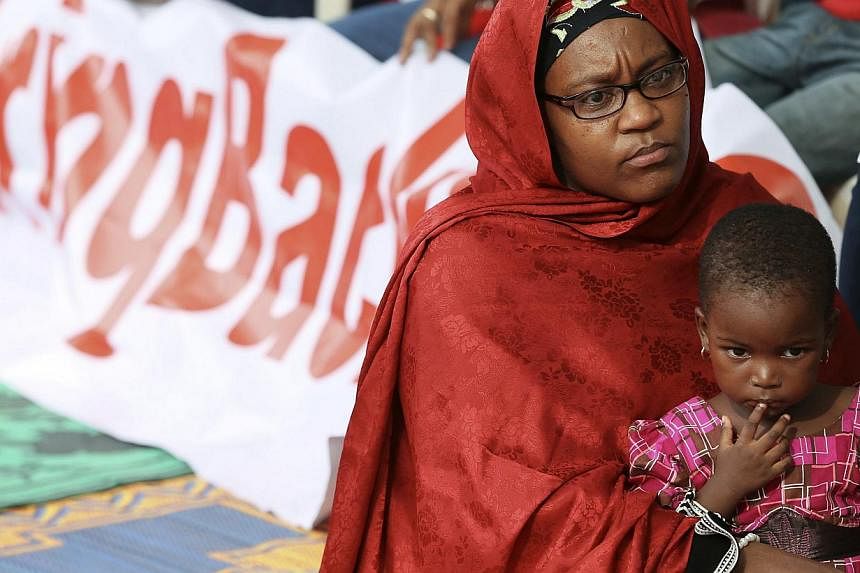JOS, Nigeria (AFP) - The United States deployed 80 military personnel to Chad on Wednesday to help find 200 girls kidnapped by Boko Haram, as Nigeria probed its deadliest attack ever with the militant group the main suspect.
In a letter to congress, US President Barack Obama said the personnel would stay in Chad until their support in ending the abduction nightmare that has outraged the world "is no longer required".
"These personnel will support the operation of intelligence, surveillance and reconnaissance aircraft for missions over northern Nigeria and the surrounding area," Mr Obama said.
The troops mark a significant boost to an existing US military effort which includes the use of surveillance drones as well as manned aircraft over Nigeria.
The Pentagon has criticised Nigeria in the past for failing to react swiftly to the rise of Boko Haram, who have been blamed for thousands of deaths since 2009 and until the kidnappings, Nigeria had resisted cooperation with the West in its fight against the group.
Nigerian emergency services on Wednesday picked through the burnt-out remains of vehicles and collapsed buildings in the New Abuja Market area of the central city of Jos, where two car bombs exploded within 20 minutes of each other on Tuesday.
Boko Haram is again blamed for the atrocity that killed at least 118 people as well as other attacks near the town where the schoolgirls were kidnapped.
The attack was the latest affront to the Nigerian government's security crackdown in response to the April 14 mass abduction.
The US described the Jos carnage - and a suicide car bombing in the northern city of Kano on Sunday - as "vicious attacks on defenceless Nigerian civilians".
Britain said the "cowardly, inhumane crime" would only strengthen the international community's resolve to defeat terror in Africa's most populous nation.
Two more attacks in villages near the girls' hometown of Chibok in north-eastern Borno state were meanwhile reported, with witnesses saying that 30 people were killed on Monday and Tuesday.
In Jos, where Boko Haram have attacked before, Plateau state governor Jonah Jang's spokesman said the bombing bore the hallmarks of the Islamist extremists.
"The investigation is still ongoing but this is clearly an extension of the terrorist activity that has affected the north-east of the country, the Boko Haram insurgents," Pam Ayuba told AFP.
The Roman Catholic Archbishop of Jos, who also blamed Boko Haram, said the insurgents were trying to sow "chaos" in the religiously divided city, hit by waves of deadly sectarian clashes over the last 15 years.
Kyari Mohammed, a Boko Haram specialist and chairman of the Centre for Peace Studies at Modibbo Adama University, said Boko Haram were "the only ones capable of doing this".
"Every other rebel or fringe group can use bombs but not of this scale or sophistication," he added.
"I have the feeling that what they want to achieve is to escalate things because of the international pressure which has built up (because of the kidnapping)." On the day of the mass abduction, Boko Haram launched a car bomb attack on a bus station in a suburb of the capital Abuja which killed 75.
They are suspected of a similar attack in the same location on May 1 which left 19 dead.
Four people were killed in Sunday's attack in Kano, although it was unclear whether the attack was linked to Boko Haram.
Rescue workers were among those who were caught up in the Jos bombings. As they tended to the injured from the first blast, the second detonated.
Improvised explosive devices were hidden in a minibus and truck, the military said.
Nigeria's National Emergency Management Agency (Nema) said late on Tuesday that 118 were killed and 56 injured but warned that the death toll could rise further.
Faced with escalating violence, Nigeria's army announced a major new recruitment drive, with spokesman Olajide Laleye warning that fresh recruits will be sent to the frontline with Boko Haram.
"If there is anybody who wants to join the Nigerian Army and who does not want to end up in the northeast... such a person need not volunteer," the army spokesman said.
Parliament on Tuesday approved a request for a further six-month extension of a state of emergency in Borno and neighbouring Yobe and Adamawa states with the caveat that non-military means should also be explored to end the violence.
Mr Jonathan is adamant that there will be no negotiations with Boko Haram on swapping the girls for militant fighters held in Nigerian jails but the government has maintained it is open to dialogue on wider issues.
In New York, Nigeria submitted a request to the United Nations to proscribe Boko Haram as an international terrorist group.
Prior to Mr Obama's troop announcement, the international attention on the plight of the missing girls has already seen specialist teams from the United States, Britain, France and Israel sent to Nigeria.
Mr Mohammed, however, said that while on the one hand international pressure was forcing the government in Abuja to act, it was also emboldening Boko Haram to mount further strikes.
"They have sleeper cells all over the northern part of the country and they're activating them. That's what they're going to do," he said.
"We should anticipate more attacks, especially if they (the government and the international community) are unable to solve the Chibok problem...
"If they have allies across the Sahel or beyond they can get more support... We have succeeded in giving them the kind of profile that they didn't have. They are now a bigger player."

